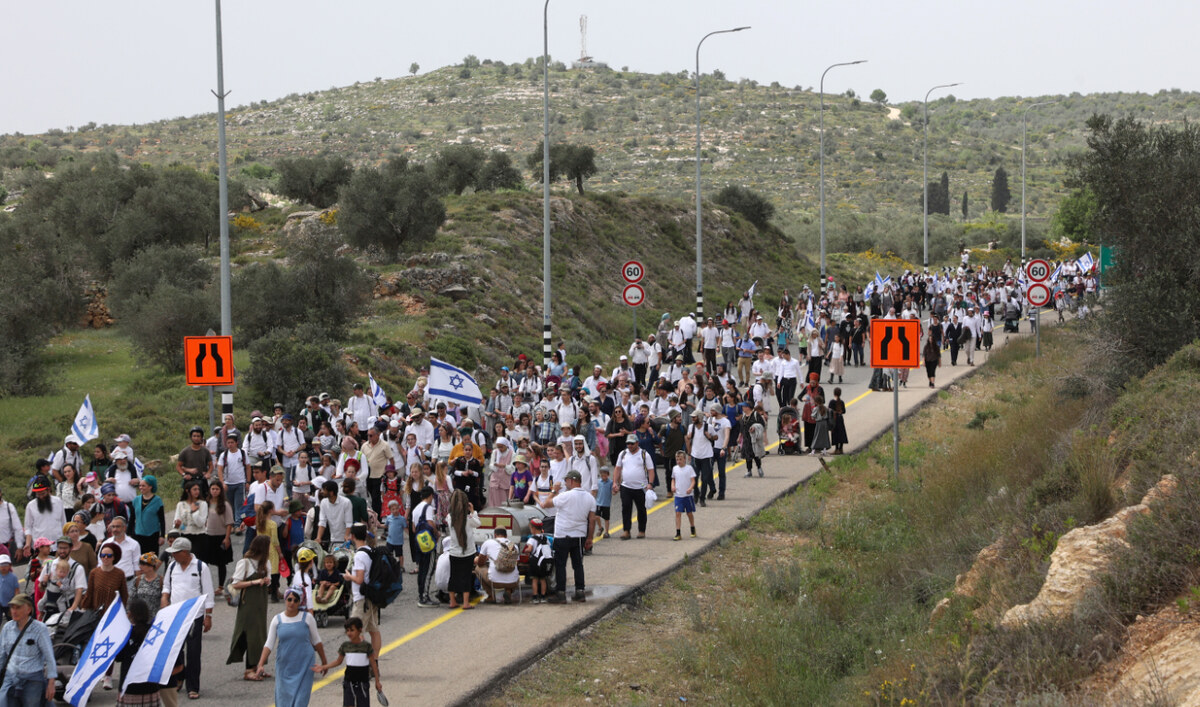GAZA: The threat of an Israeli incursion into Gaza’s southernmost town of Rafah persisted Sunday, with Israeli Prime Minister Benjamin Netanyahu promising “safe passage” to civilians displaced there.
In an interview airing Sunday, Netanyahu reiterated his intention to extend Israel’s military operation to the city.
Despite international alarm over the potential for carnage in a city crammed with more than half of the Gaza Strip’s 2.4 million people, Netanyahu told ABC News: “We’re going to do it.”
He conceded he agrees “with the Americans” that the operation will need to first plan for the impact on civilians.
“We’re going to do it while providing safe passage for the civilian population so they can leave,” he said, according to published extracts of the interview.
But it is unclear where such a large number of people, who are pressed up against the border with Egypt and sheltering in makeshift tents, can go.
When asked, Netanyahu would only say they are “working out a detailed plan.”
As Israeli forces have extended steadily southwards, Rafah has become the last major Gaza city that troops have yet to enter, even as it is bombarded by air strikes almost daily.
“They said Rafah is safe, but it is not. All places are being targeted,” Palestinian Mohammed Saydam said after an Israeli strike destroyed a police vehicle in Rafah on Saturday.
The Israeli premier, who contends “victory” over Hamas cannot be achieved without clearing battalions in Rafah, directed his military on Friday to prepare for the operation. His announcement set off a chorus of concern from world leaders and aid groups.
“The people in Gaza cannot disappear into thin air,” German Foreign Minister Annalena Baerbock wrote on social media platform X, adding that an Israeli offensive on Rafah would be a “humanitarian catastrophe in the making.”
Saudi Arabia’s foreign ministry warned Saturday of “very serious repercussions of storming and targeting” Rafah and called for an urgent UN Security Council meeting, while UK Foreign Secretary David Cameron said he is “deeply concerned” about the prospective offensive.
“The priority must be an immediate pause in the fighting to get aid in and hostages out,” he wrote.
Intense fighting
The war in Gaza was sparked by Palestinian Islamist group Hamas’s unprecedented October 7 attack on Israel, which resulted in the deaths of about 1,160 people, mostly civilians, according to an AFP tally based on official figures.
Vowing to eliminate Hamas, Israel launched a massive military offensive in Gaza that the territory’s health ministry says has killed at least 28,064 people, mostly women and children.
Militants also seized 250 hostages, 132 of whom are still in Gaza although 29 are presumed dead, Israel has said.
Netanyahu announced the plan for a ground operation in Rafah only days after US Secretary of State Antony Blinken visited Israel seeking a ceasefire and hostage-prisoner exchange.
Netanyahu has rejected the proposed truce after what he said were “bizarre demands” from Hamas.
But Israel’s plans for Rafah have drawn sharp rebuke from main ally and military backer Washington, with the State Department warning that if not properly planned, such an operation risks “disaster.”
In unusually sharp criticism, US President Joe Biden on Thursday called Israel’s retaliatory campaign “over the top.”
Gaza’s Hamas rulers warned on Saturday that a full-scale Israeli invasion of Rafah could cause “tens of thousands” of casualties.
The office of Palestinian president Mahmud Abbas said the move “threatens security and peace in the region and the world” and is “a blatant violation of all red lines.”
The Israeli military said it killed two “senior Hamas operatives” in a strike on Rafah Saturday.
It was part of a wider bombardment that killed at least 25 people in the city, according to the Hamas-run health ministry.
Hamas tunnels
To the north in Gaza City, Israel’s military claimed that its troops uncovered a Hamas tunnel under the evacuated headquarters of the UN agency for Palestinian refugees (UNRWA).
Israeli Foreign Minister Israel Katz called for its head, Philippe Lazzarini, to quit.
Lazzarini said the agency had not operated from the compound since October 12 when staff evacuated it under instruction from Israeli forces.
Already under pressure after Israel claimed 12 UNRWA staff were involved in the October 7 Hamas attack, he called for an independent investigation into the latest Israeli accusations.
An AFP photographer was among a number of journalists taken to the compound and tunnel by the Israeli military on Thursday.
UN premises are considered “inviolable” in international law and immune from “search, requisition, confiscation, expropriation and any other form of interference.”
Hamas has repeatedly denied Israeli accusations that it has dug a network of tunnels under schools, hospitals and other civilian infrastructure as cover for its activities.
Public fury
The war, now in its fifth month, has spawned intensifying public fury in Israel.
Protesters took to the streets of Tel Aviv on Saturday night to demand the release of the hostages, Netanyahu step down and fresh elections be called.
“It’s clear Netanyahu is dragging out the war, he has no idea what to do on the day after,” Israeli protester Gil Gordon said.
The war has had far-reaching impact well bedyond Israel and Gaza, with violence involving Iran-backed allies of Hamas surging across the Middle East.
A senior Hamas officer survived an Israeli assassination attempt in Lebanon, Palestinian and Lebanese security sources told AFP, but two other people including a Hezbollah member were killed in the attack.
And in Syria, Israeli strikes near Damascus killed three people, a war monitor said, adding the targeted neighborhood hosted villas for top military and civilian officials.



































